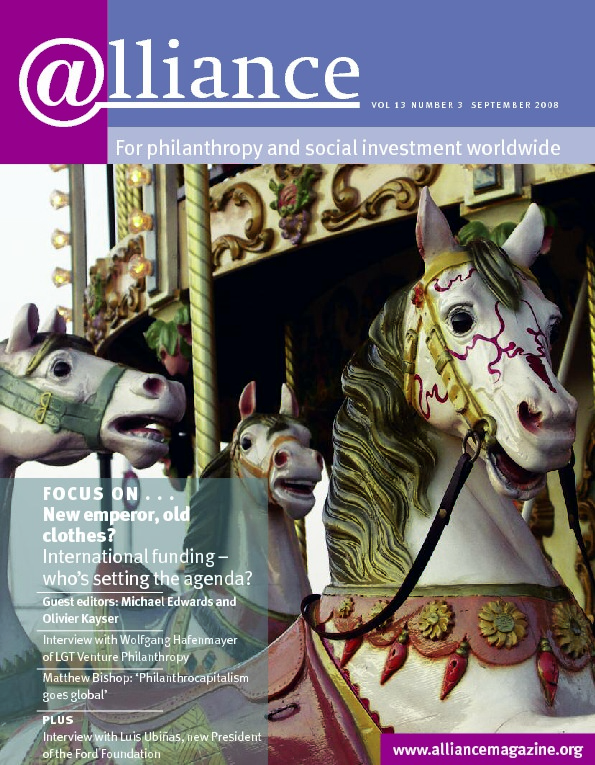 When I coined the term ‘philanthrocapitalism’ in 2006 in an extended essay for The Economist, I had no idea that it would spark such debate. It is often caricatured as no more than an interest in performance and measurement, but I believe it is about much more than that. I believe it marks a radical new departure in philanthropy and in capitalism, with far-reaching social and political consequences.[1]
When I coined the term ‘philanthrocapitalism’ in 2006 in an extended essay for The Economist, I had no idea that it would spark such debate. It is often caricatured as no more than an interest in performance and measurement, but I believe it is about much more than that. I believe it marks a radical new departure in philanthropy and in capitalism, with far-reaching social and political consequences.[1]
Philanthrocapitalism involves some of the most world’s most talented and successful people, most prominent among whom is Bill Gates, turning their minds to problems like education, disease, climate change and terrorism. What they have in common is that they are self-made men and women who have made spectacular fortunes by spotting trends, challenging orthodoxies and embracing the opportunities of globalization and technological change. As well as having enormous wealth to give away, they have connections, influence and an understanding of how the world works.
But they are far from alike in the way they give. Some, usually from the financial sector, have applied their talent for investing to their giving. Warren Buffett, who as an investor tends to pick a handful of great companies whose shares he owns for decades, has repeated this formula in giving away most of his money to the man who he sees as the ‘best in the business’, Bill Gates. British hedge fund boss Christopher Cooper-Hohn, a data-driven investor, is adopting a similarly measurement-based approach to giving through the Children’s Investment Fund Foundation that he created with his wife Jamie. Others take a bigger-picture approach, such as Ted Turner whose $1 billion pledge to support the United Nations in 1997 arguably marks the start of the age of philanthrocapitalism.
In contrast to Gates, who is leading big initiatives to solve big global problems, other philanthrocapitalists are promoting bottom-up change. Jeff Skoll from eBay is supporting social entrepreneurship and helping to breathe new life into the non-profit sector. Rock star Bono sees his role as mobilizing public opinion, using the power of ‘celanthropy’ to argue for big increases in aid for developing countries, working through his DATA organization, the force behind the ‘One’ campaign.
Like capitalism, philanthrocapitalism is a global phenomenon, with a new generation of ambitious philanthropists emerging from the developing world. People like Mexican telecoms billionaire Carlos Slim, who has pledged $10 billion to fight poverty in Latin America, or Indian software tycoon Azim Premji, who is bringing education to poor children, bring new insights and skills to the challenges of development. Perhaps the best example here is Sudanese mobile phone boss Mo Ibrahim. His business experience has led him to believe that poverty in Africa will be defeated only through political change, so he is using his annual prize for the best African politician to open up debate about political leadership.
The strength of capitalism is that it creates an environment where innovation is rewarded, and philanthrocapitalism promises to bring that dynamism to the world of giving. It is challenging to incumbents, it is disruptive, and it will make mistakes, but its ‘creative destruction’ might bring not just a boom in the amount given but a surge in its impact.
Some critics worry that philanthrocapitalism will somehow undermine democracy and civil society, and erode government responsibility. Fear of the political power of the rich is not new, but to cast the rich as inevitably self-serving and anti-democratic is mistaken. From the first golden age of modern philanthropy in Renaissance Europe, the rich have often proved to be more responsive to the needs of the poor than the state. Two hundred years ago, William Wilberforce led the campaign against the slave trade, and today philanthropists like George Soros are championing democratic change across the world.
Of course, there needs to be transparency and the rich need to be accountable for the results of their philanthropy, not just feted for its scale. These are the principles that should underpin a new social contract between the rich and the rest.
Philanthrocapitalism will succeed in achieving its considerable potential only if its exponents take seriously the challenge of being businesslike in addressing today’s big issues. They need to be innovative, thoughtful, analytical, driven, collaborative and, as there is no simple benchmark for success in philanthropy, brutally honest and self-critical about how they are doing. Here’s hoping they succeed.
Matthew Bishop is Chief Business Writer/American Business Editor of The Economist. Email matthewbishop@economist.com
1 This article is based on a 7 July opening post to a discussion on philanthrocapitalism hosted by the Global Philanthropy Forum. The views and ideas expressed in it are discussed at greater length in Philanthrocapitalism: How the rich can save the world by Matthew Bishop and Michael Green, to be published in October.





Comments (0)